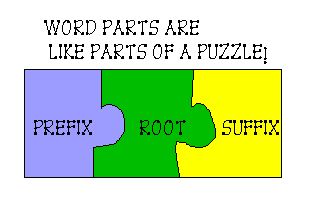WORDY WEDNESDAY: Prefixes, Suffixes, Roots, Oh My!
When Joshua and I teach vocabulary, we try to do a few things:
1. Relate the word to anything we think the students might already know. (“Aquaduct? Well, you know what aquatic means, don’t you?”)
Of course, this is where we say, “You know more than you think you know!”
2. We ask the students if they can tell us anything about the word based on the context. Is it happy or sad? Is there a word near that word that helps you?
3. We help them examine the type of word it is. We say over and over to them that OUS words are often adjectives (delicious) and ATE words can often be verbs.
4. We help the students examine roots and affixes.
a. Prefix–an affix (“stuck on”) to the beginning of a word
b. Suffix–affix added to the end of a word
We also give the students tools all the time. Below is a list of prefixes and suffixes that we give to our students and discuss with them, along with their meanings.
Be a lifelong student! If you are an adult, these vocabulary tips will still help you every day.
generous, generate, generation, geneology, gender
dictate, verdict, edict, contradict, predict, diction, indict
perspective, aspect, spectator, spectacle, suspect
surpass, summit, supersede, superstition
tension, extend, tendency, tendon, tent, distend
transfer, transient, transitory, transgress, transport
conduct, document, doctrine, induce, indoctrinate
company, collaborate, comply, congruent,
convert, revert, subvert, divert, diverse, extrovert, versatile
eloquent, logic, apology, monologue, dialogue, prologue
sensitive, sensation, consent, dissent, assent, sentiment
denounce, defraud, decry, deplete, devoid, defile
anonymous, nominate, renounce, renown, misnomer
closet, enclose, disclose, include, conclude, seclude
vocal, advocate, vocation, convoke, revoke, avow
malicious, malady, dismal, malign, malevolent
fracture, fraction, fragment, fragile, frail, fractious
objective, obsolete, obscure, obstruct, obstinate
submissive, subordinate, sublime, subtle, subversion
abandon, abhor, abstain, absolve, abstruse, abstract
progress, regress, gradual, digress, degrade, transgress
second, sequel, sequence, consequence, prosecute
prolific, profuse, prodigal, prtracted, prodigy, propensity
inquire, question, request, quest, query, acquire, querulous
sacrifice, sanctuary, sanctify, sanction, consecrate
scribble, describe, script, prescribe, ascribe, inscribe
apathy, sympathy, empathy, antipathy, passionate
disdain, dissuade, dismay, disparate, disparage
circumference, circulation, circumstances, circumvent
nonviolent, uncooperative, inappreciative, anonymous
adhere, adjective, addict, adverb
infrastructure, infraction, infrared, infra-bass







